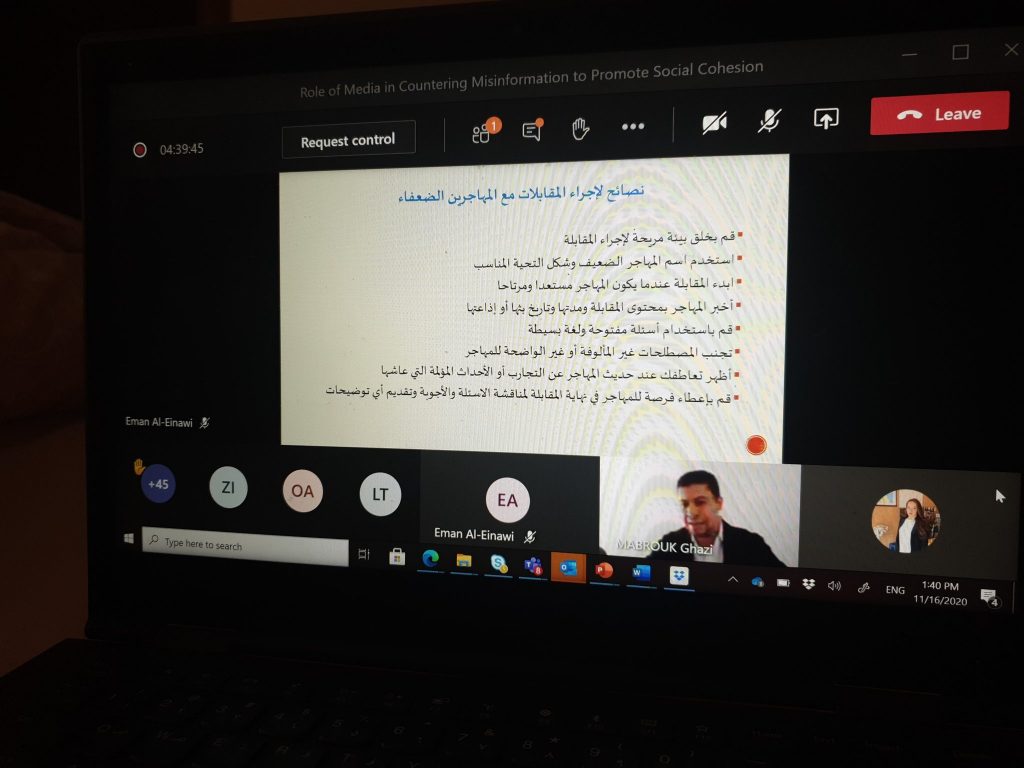The Representative of the Secretary-General of the United Nations, Resident Coordinator in the State of Kuwait, Dr. Tariq Al-Sheikh, in partnership with Kuwaiti Ministry of Information(MOI) represented by His Excellency Mr. Faisal Al-Mutlaqim, Undersecretary of the Ministry of Foreign Information and the Kuwaiti Minister of Information, organized a special seminar for media professionals in the State of Kuwait on “The role of the media in confronting false information with the aim of strengthening social cohesion ”
The seminar aimed to emphasize the need to confront misinformation to enhance social cohesion by highlighting the importance of the role of the media in times of crisis.
Print and the broadcast media, in addition to websites, play an important role in all countries and societies in terms of sharing news and information and influencing public opinion.
The influence has doubled in recent years due to the rapid development of communication technologies.
Dr. Tariq Al-Sheikh, Representative of the Secretary-General of the United Nations and the Resident Coordinator to the State of Kuwait, noted that the media is a very powerful platform as it exerts a great influence on public opinion, and sets the agenda and tone for public debate.
The media may also be a crucial means for ensuring inclusiveness and to hear the voices of even the most vulnerable groups such as refugees, migrants. He added, “The United Nations family in the State of Kuwait is committed to enhancing journalistic capacity and enhancing professionalism.”
This online workshop is one of the fruits of cooperation between the Ministry of Information and the United Nations resident and non-resident agencies in Kuwait.
The United Nations this year celebrates the 75th anniversary of its founding and our commitment to freedom of expression.
In his opening speech, His Excellency Mr. Faisal Al Mutlakim, Undersecretary of the Ministry of Foreign Information and Kuwaiti Minister of Information said “The international community is in the confrontation against the pandemic that has not ceased to wreak havoc on the world,
Like every confrontation, here also the media represents two sides, a real face and a false counterpart. The false media only aims to spread discord.”
He added, “We in Kuwait are not immune to this media confrontation and misinformation is more dangerous than Covid 19.
The State of Kuwait, represented by the Government Communication Center of the Council of Ministers, has directed the official authorities to confront the scourge of rumors and misinformation.”
The MOI has also made efforts through multiple official print and broadcast channels, to control rumors and false information on social media.
Dr. Samer Haddadin, head of the United Nations High Commissioner for Refugees (UNHCR) office said, “It is no doubt that one of the most serious challenges faced by the world is the spread of misinformation.”
Misinformation can create crisis situations or situations of public emergency is also a risk of hate speech through the Internet.
This can target people under the mandate of the UNHCR and cause hindrance in its mission of providing protection and finding durable solutions.
This can negatively affect the lives of more than 79.5 million refugees, internally displaced and stateless people around the world, as indicated in the UNHCR report on its interventions and response to the Covid-19 virus.
Recently issued, cases of discrimination and the spread of hate speech against people of concern to the UNHCR have been recorded in 74 countries out of 173 countries (approximately 43%).
Therefore, the Commission has to devote additional efforts in response to the risks and challenges associated with the spread of the virus, as the Commission has been able to launch campaigns Awareness raising and allocating channels through which to communicate with the relevant persons for rapid intervention in more than 100 countries.
As we know, the Corona pandemic provided evidence of the solidarity of states and societies with each other in order to address the impact of this pandemic and the challenges it posed.
The Covid-19 epidemic also led to the emergence of a new wave of misinformation and conspiracy theories about the size of the epidemic, the origin of the disease, its prevention, diagnosis and treatment, and false information, including deliberate misinformation, spread through social media, text messages and the media, which poses a threat to global health and ignites speech. Hate and discrimination.
The general objective of the symposium is to enhance the ability of media professionals to:
- Knowledge of best practices and United Nations policies in combating disinformation; And the importance of the role of media professionals in enhancing social cohesion by combating misinformation and false information.
- Gain essential knowledge about international human rights law and relevant human rights mechanisms; And its effects in the daily reports.
- Identify the main considerations while writing media articles on vulnerable groups and humanitarian situations
- Define tools and data portals to use to obtain accurate and up-to-date information from the United Nations Migration Network in Kuwait
The media has an important role in influencing the awareness of the recipient. And influencing his beliefs, behavior, emotion, or attitudes and points of view, and transforming information into knowledge, conclusion, or new standards related to life and its principles, especially human dignity.
In conclusion, it is worth noting that the Secretary-General of the United Nations has highlighted the key role of free, independent, and responsible media in promoting transparency and trust, as essential to achieving adequate support and general compliance with collective efforts. That is why the United Nations launched this initiative to share verified information. It is an initiative to share compelling and clear content, fact-based advice, information that may be critical of life, and positive stories highlighting best practices around the world.

